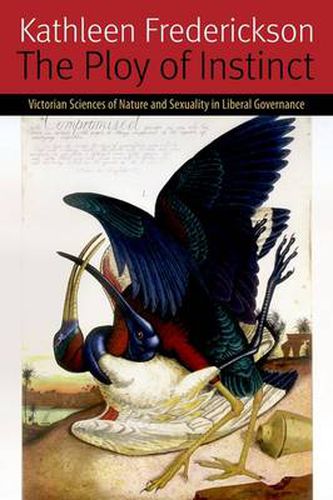Readings Newsletter
Become a Readings Member to make your shopping experience even easier.
Sign in or sign up for free!
You’re not far away from qualifying for FREE standard shipping within Australia
You’ve qualified for FREE standard shipping within Australia
The cart is loading…






This title is printed to order. This book may have been self-published. If so, we cannot guarantee the quality of the content. In the main most books will have gone through the editing process however some may not. We therefore suggest that you be aware of this before ordering this book. If in doubt check either the author or publisher’s details as we are unable to accept any returns unless they are faulty. Please contact us if you have any questions.
It is paradoxical that instinct became a central term for late Victorian sexual sciences as they were elaborated in the medicalized spaces of confession and introspection, given that instinct had long been defined in its opposition to self-conscious thought. The Ploy of Instinct ties this paradox to instinct’s deployment in conceptualizing governmentality.
Instinct’s domain, Frederickson argues, extended well beyond the women, workers, and savages to whom it was so often ascribed. The concept of instinct helped to gloss over contradictions in British liberal ideology made palpable as turn-of-the-century writers grappled with the legacy of Enlightenment humanism. For elite European men, instinct became both an agent of progress and a force that, in contrast to desire, offered a plenitude in answer to the alienation of self-consciousness.
This shift in instinct’s appeal to privileged European men modified the governmentality of empire, labor, and gender. The book traces these changes through parliamentary papers, pornographic fiction, accounts of Aboriginal Australians, suffragette memoirs, and scientific texts in evolutionary theory, sexology, and early psychoanalysis.
$9.00 standard shipping within Australia
FREE standard shipping within Australia for orders over $100.00
Express & International shipping calculated at checkout
This title is printed to order. This book may have been self-published. If so, we cannot guarantee the quality of the content. In the main most books will have gone through the editing process however some may not. We therefore suggest that you be aware of this before ordering this book. If in doubt check either the author or publisher’s details as we are unable to accept any returns unless they are faulty. Please contact us if you have any questions.
It is paradoxical that instinct became a central term for late Victorian sexual sciences as they were elaborated in the medicalized spaces of confession and introspection, given that instinct had long been defined in its opposition to self-conscious thought. The Ploy of Instinct ties this paradox to instinct’s deployment in conceptualizing governmentality.
Instinct’s domain, Frederickson argues, extended well beyond the women, workers, and savages to whom it was so often ascribed. The concept of instinct helped to gloss over contradictions in British liberal ideology made palpable as turn-of-the-century writers grappled with the legacy of Enlightenment humanism. For elite European men, instinct became both an agent of progress and a force that, in contrast to desire, offered a plenitude in answer to the alienation of self-consciousness.
This shift in instinct’s appeal to privileged European men modified the governmentality of empire, labor, and gender. The book traces these changes through parliamentary papers, pornographic fiction, accounts of Aboriginal Australians, suffragette memoirs, and scientific texts in evolutionary theory, sexology, and early psychoanalysis.